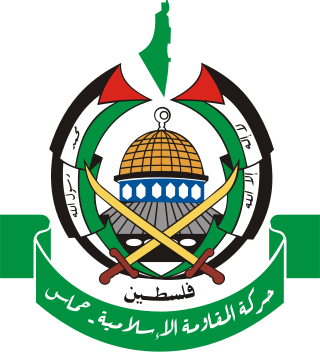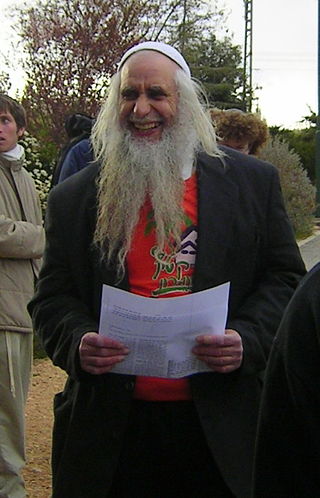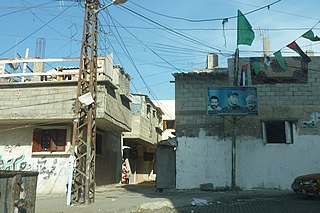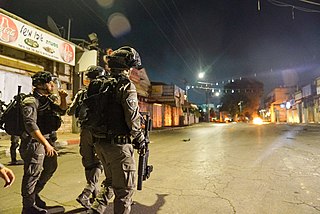Related Research Articles

The Gaza Strip, or simply Gaza, is a polity and the smaller of the two Palestinian territories. On the eastern coast of the Mediterranean Sea, Gaza is bordered by Egypt on the southwest and Israel on the east and north.

Hamas, an acronym of its official name, Harakat al-Muqawama al-Islamiya, is a Palestinian Sunni Islamist political and military movement governing the Israeli-occupied Gaza Strip since 2007.

The Palestinian Authority, officially known as the Palestinian National Authority or the State of Palestine, is the Fatah-controlled government body that exercises partial civil control over West Bank areas "A" and "B" as a consequence of the 1993–1995 Oslo Accords. The Palestinian Authority controlled the Gaza Strip prior to the Palestinian elections of 2006 and the subsequent Gaza conflict between the Fatah and Hamas parties, when it lost control to Hamas; the PA continues to claim the Gaza Strip, although Hamas exercises de facto control. Since January 2013, the Palestinian Authority has used the name "State of Palestine" on official documents, although the United Nations continues to recognize the Palestinian Liberation Organization (PLO) as the "representative of the Palestinian people".

The Second Intifada, also known as the Al-Aqsa Intifada, was a major uprising by Palestinians against the Israeli occupation, characterized by a period of heightened violence in the Palestinian territories and Israel between 2000 and 2005. The general triggers for the unrest are speculated to have been centered on the failure of the 2000 Camp David Summit, which was expected to reach a final agreement on the Israeli–Palestinian peace process in July 2000. An uptick in violent incidents started in September 2000, after Israeli politician Ariel Sharon made a provocative visit to the Al-Aqsa compound, which is situated atop the Temple Mount in East Jerusalem; the visit itself was peaceful, but, as anticipated, sparked protests and riots that Israeli police put down with rubber bullets, live ammunition, and tear gas. Within the first few days of the uprising, the IDF had fired one million rounds of ammunition.
Sheikh Ahmed Ismail Hassan Yassin was a Palestinian politician and imam who founded Hamas, a militant Islamist and Palestinian nationalist organization in the Gaza Strip, in 1987.
Abdel Aziz al-Rantisi was a Palestinian political leader and co-founder of Hamas, along with Sheikh Ahmed Yassin.
The Murder of the Hatuel family was a shooting attack on May 2, 2004, in which Palestinian militants killed Tali Hatuel, a Jewish settler, who was eight months pregnant, and her four daughters, aged two to eleven. The attack took place near the Kissufim Crossing near their home in Gush Katif bloc of Israeli settlements in the Gaza Strip during the Second Intifada. After shooting at the vehicle in which Hatuel was driving with her daughters, witnesses said the militants approached the vehicle and shot the occupants repeatedly at close range.
The Izz ad-Din al-Qassam Brigades, named after Izz ad-Din al-Qassam, is the military wing of the Palestinian organization Hamas. Currently led by Mohammed Deif, IQB is the largest and best-equipped militant group operating within Gaza today.

Abdul Rahman ibn Abdul Aziz al-Sudais, better known as al-Sudais, is the Chief Imam of the Grand Mosque, Masjid al-Haram in Makkah, Saudi Arabia; the President of the General Presidency for the Affairs of the Two Holy Mosques; a renowned Qāriʾ ; he was the Dubai International Holy Qur'an Award's "Islamic Personality Of the Year" in 2005. Al-Sudais has preached Islam's opposition to "explosions and terrorism", and has called for peaceful inter-faith dialogue, but also been criticized for vilifying non-Muslims and especially Jews in his sermons. He has denounced the treatment of Palestinians by Israeli settlers and the state of Israel, and called for more aid to be sent to Palestinians. He has also been noted for identifying women's un-Islamic behavior as in part responsible for the winter 2006 drought in Saudi Arabia. In 2016, he delivered the very important Hajj sermon to a multitude of pilgrims gathered at Arafat after prayers.

Gideon Levy is an Israeli journalist and author. Levy writes opinion pieces and a weekly column for the newspaper Haaretz that often focus on the Israeli occupation of the Palestinian territories. Levy has won prizes for his articles on human rights in the Israeli-occupied territories. In 2021, he won Israel's top award for journalism, the Sokolov Award.

Sheikh Raed Salah Abu Shakra is a Palestinian religious leader from Umm al-Fahm, Israel. He is the leader of the Northern Branch of the Islamic Movement in Israel. Salah was elected mayor of his town Umm al-Falm, an Israeli-Arab city bordering the Green Line, three times. As a Palestinian with Israeli citizenship, he came to prominence for his defense of the holy sites and his participation on the Mavi Marmara, the Turkish boat that was stormed by Israeli navy as it attempted to break the siege of Gaza in May 2010.

Rabbi Menachem Froman was an Israeli Orthodox rabbi, and a peacemaker and negotiator with close ties to Palestinian religious leaders. A founding member of Gush Emunim, he served as the chief rabbi of Tekoa in the West Bank. He was well known for promoting and leading interfaith dialogue between Jews, Christians and Muslims, focusing on using religion as a tool and source for recognizing the humanity and dignity of all people. Together with a Palestinian journalist close to Hamas, Rabbi Froman drafted a ceasefire agreement between Israel and the Hamas government in the Gaza Strip, known as the Froman-Amayreh Agreement. The agreement was endorsed by Hamas government, but it did not receive any official response from the Israeli government.

Al-Shati, also known as Shati or Beach camp, is a Palestinian refugee camp located in the northern Gaza Strip along the Mediterranean Sea coastline in the Gaza Governorate, and more specifically Gaza City.
The Gaza–Israel conflict is a localized part of the Israeli–Palestinian conflict beginning in 1948, when 200,000 Palestinians fled or were expelled from their homes, settling in the Gaza Strip as refugees. Since then, Israel has fought 15 wars against the Gaza Strip. The number of Gazans reportedly killed in the most recent 2023 war — 34,000 — is higher than the death toll of all other wars of the Arab-Israeli conflict.

The Gaza War, also known as Operation Cast Lead, also known as the Gaza Massacre, and referred to as the Battle of al-Furqan by Hamas, was a three-week armed conflict between Gaza Strip Palestinian paramilitary groups and the Israel Defense Forces (IDF) that began on 27 December 2008 and ended on 18 January 2009 with a unilateral ceasefire. The conflict resulted in 1,166–1,417 Palestinian and 13 Israeli deaths. Over 46,000 homes were destroyed in Gaza, making more than 100,000 people homeless.
Sheikh Radwan is a district of Gaza City located nearly 3 kilometers (1.9 mi) northwest of the city center. It borders al-Shati camp to the southwest, Rimal to the south, and Jabalia to the east. The Sheikh Radwan Cemetery is located in the district. It contains hundreds of graves for Palestinians killed in the Israeli–Palestinian conflict, including Hamas leaders Ahmed Yassin, Abdel Aziz al-Rantissi, and Said Siam.

Egypt–Palestine relations are the bilateral relations between the Arab Republic of Egypt and the State of Palestine. Egyptian President Gamal Abdel Nasser was a strong supporter of the Palestinian cause and he favored self-determination for the Palestinians. Although the Egyptian government has maintained a good relationship with Israel since the Camp David Accords, most Egyptians strongly resent Israel, and disapprove of the close relationship between the Israeli and Egyptian governments.

Hamas has governed the Gaza Strip in Palestine since its takeover of the region from rival party Fatah in June 2007. Hamas' government was led by Ismail Haniyeh from 2007 until February 2017, when Haniyeh was replaced as leader of Hamas in the Gaza Strip by Yahya Sinwar. As of November 2023, Yahya Sinwar continues to be the leader of Hamas in the Gaza Strip. In January 2024, due to the ongoing Israel–Hamas war, Israel said that Hamas lost control of most of the northern part of the Gaza Strip. In May 2024, Hamas regrouped in the north.

The Sheikh Omar Hadid Brigade, also known as Islamic State in Gaza, is an Islamist militant group affiliated with the Islamic State in Iraq and the Levant that was reportedly active in the Gaza Strip around 2015. Its goals have consistently matched those of the Islamic State, in that it seeks to establish the al-Sham caliphate. As such, it opposes all forms of Palestinian nationalism while also supporting the elimination of all Jews and other ethno-religious 'infidels' from the region.

A major outbreak of violence in the ongoing Israeli–Palestinian conflict commenced on 10 May 2021, though disturbances took place earlier, and continued until a ceasefire came into effect on 21 May. It was marked by protests and police riot control, rocket attacks on Israel by Hamas and Palestinian Islamic Jihad (PIJ), and Israeli airstrikes in the Gaza Strip. The crisis was triggered on 6 May, when Palestinians in East Jerusalem began protesting over an anticipated decision of the Supreme Court of Israel on the eviction of six Palestinian families in the East Jerusalem neighborhood of Sheikh Jarrah. Under international law, the area, effectively annexed by Israel in 1980, is a part of the Israeli-occupied West Bank; On 7 May, according to Israel's Channel 12, Palestinians threw stones at Israeli police forces, who then stormed the Al-Aqsa Mosque compound using tear gas, rubber bullets, and stun grenades. The crisis prompted protests around the world as well as official reactions from world leaders.
References
- ↑ The Middle East: Abstracts and index. Library Information and Research Service. 2006. p. 235. Retrieved 13 May 2012.
- ↑ Israeli, Raphael (2004). The Iraq WAR: Hidden Agendas and Babylonian Intrigue : The Regional Impact on Shi'ites, Kurds, Sunnis and Arabs. Sussex Academic Press. p. 215. ISBN 978-1-903900-89-5 . Retrieved 13 May 2012.